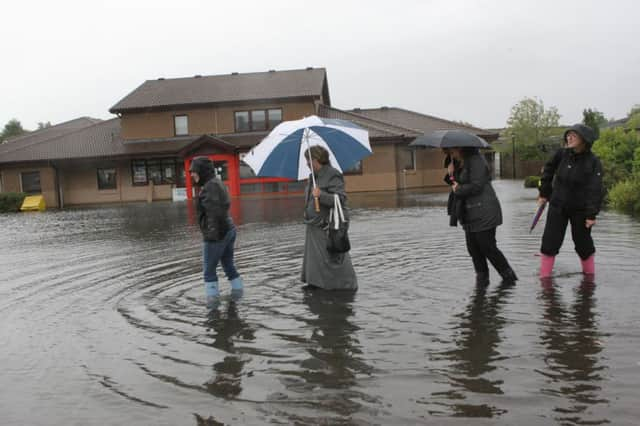Hurricane Bertha wreaks havoc in Scotland


Torrential rain brought by the former hurricane caused the wettest day of the year so far, with Fair Isle in Shetland seeing 132.6mm of rain between 10am on Saturday and 10am on Sunday – almost double the 70.3mm full-month average for August.
Lossiemouth in Moray was deluged with 100mm of rain during the same time, compared with a full-month average of 61.9mm.
Advertisement
Hide AdAdvertisement
Hide AdThe Scottish Environment Protection Agency (Sepa) issued 41 flood warnings yesterday covering Aberdeenshire, Speyside, Moray, Caithness and Sutherland, and Tayside.
The Met Office issued yellow “be aware” warnings of rain for the Central, Tayside and Fife, Grampian, Highlands and Islands, and Strathclyde areas.
ScotRail warned routes were severely disrupted by flooding and advised commuters to avoid rail travel between Aberdeen and Inverness, and Perth and Inverness. Forecasters last night said more heavy rain and strong winds were likely overnight and warned of difficult driving conditions because of localised flooding, with gales around exposed northern coasts.
Around 200 homes in Elgin had to be evacuated yesterday afternoon as the River Lossie rose to dangerous levels. Pensioners and children were among those taken to Elgin High School as the river was monitored.
Moray Council leader Allan Wright said: “The fire service said to us it is much easier to evacuate homes while people can still walk out rather than have to go for them in boats.”
An £86 million flood prevention scheme is being constructed in the area following flooding in 2009.
Mr Wright added: “The flood prevention scheme won’t be completed until next May but had it been completed, then we would not have been evacuating people as we are at this time.
“Every hour there is a meeting of the joint emergency response team because there are issues across Moray. The Spey is higher than it was in 2009. There is a risk with River of Moy, while the A96 may have to be closed east of Findhorn.”
Advertisement
Hide AdAdvertisement
Hide AdStephen Cooper, head of direct services with Moray Council, said the flooding was localised but widespread.
“We have had engineers out all night working on the situation and giving out sandbags,” he said. “We are going to set up local distribution areas to give out sandbags to local residents.”
A spokesman for Aberdeenshire Council said the River Carron and River Deveron were being closely monitored, with flood protection equipment and flood wardens deployed in Stonehaven and Huntly as a precaution. Drivers were urged to exercise caution on the Keith to Elgin road, which had been blocked in both directions because of flooding.
Among the worst affected routes in the north of Scotland was the Durness to Tongue road, which was closed at the south end of Loch Eriboll.
The Altnaharra to Syre road was closed at Grumbeg Bridge, while fallen trees closed the Skiach to Evanton road.
The A835 was also shut by a landslip near Ullapool, disrupting travel between the town and Inverness. Part of the road at Duthil near Carrbridge fell away, and the Keith Show was cancelled due to the severe weather. The Dornoch Bridge in Sutherland was also closed to high-sided vehicles.
Traffic Scotland operator manager Stein Connelly said motorists in north-east Scotland and the Highlands and Islands faced difficult conditions.
He said: “We would advise people in these areas to prepare for some travel disruption and to allow extra time for their journeys. They should also check the relevant websites for up-to-date travel information.”
Advertisement
Hide AdAdvertisement
Hide AdOn the rail network, flooding at Kingussie meant trains were unable to run between Perth and Inverness, while buses were replacing trains between Elgin and Huntly. CalMac ferry services were also affected, with sailings from Berneray and Leverburgh cancelled.
There were a number of landslides in the Highlands, including one at a pig farm in Nairn that opened up a large hole on the edge of a field. Scottish Fire and Rescue Service crews attended over 50 incidents in the Highlands, many involving people stranded after attempting to drive through flooded sections of road.
A Police Scotland spokesman said: “Floodwater can mask damage to the road, resulting in hidden hazards, and even a few inches of fast-flowing water can be powerful enough to knock someone off their feet or leave a car unable to proceed.”
Meanwhile, gusts of 108mph were measured on Cairngorm summit at around 8am yesterday. An important footbridge for walkers in the Cairngorms was also washed away.
The bridge across the Derry Burn at the foot of Glen Derry – a link in the most commonly used route through the Lairig Ghru Pass – was lifted from its foundations and swept downstream. The strongest wind recorded on non-mountain sites yesterday was 62mph at the Tain Range, Ross and Cromarty, at around 8am.
In England, a taxi passenger was injured in Hull when a tree crashed into a cab.
June Stephenson, 57, was in the back of a taxi waiting for her husband Martin to get in when a tree fell on to the vehicle during a sudden squall the couple said was “like a tornado”.
Mrs Stephenson suffered minor injuries to her arms and face in the incident, which left a trail of uprooted trees, damaged roofs and flooding.
Advertisement
Hide AdAdvertisement
Hide AdThe Met Office has forecast conditions to ease over the next few days, but localised showers will still affect some areas. Forecasters said the worst of the rain would clear from north-east Scotland but heavy showers were still likely.
Persistent heavy rain would again affect parts of the Highlands, along with Skye and the Outer Hebrides, but the Met Office claimed the worst was over.
Hurricane Bertha hit Caribbean islands last week before dissipating over the central Atlantic. It was downgraded to a tropical storm in the US before it crossed the ocean.